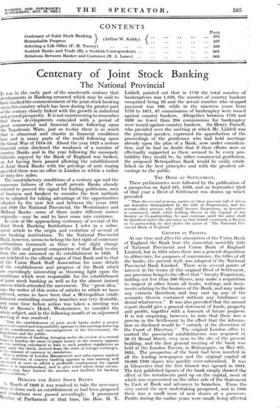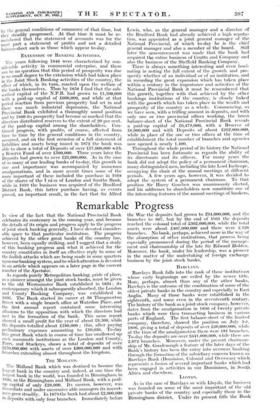GROWTH IN PROFITS.
At one time and after the absorption of the Union Bank of England the Bank bore the somewhat unwieldy title of National Provincial and Union Bank of England Limited,- but in 1924 when there was a general disposition to abbreviate, for purposes of convenience, the titlespo of all the banks, the present style was adopted of the National Provincial Bank Limited. There were several points of interest in the terms. of this original Deed of Settlement, one provision being to the effect that " twenty Proprietors, holding not less than 500 Shares, may make a requisition to inspect at office hours all books, writings and docu- ments relating to the business of the Bank, and may make any extracts therefrom , and may cast up any' of the accounts therein contained without any hindrance or denial whatsoever." It was also provided that the annual report should give a general statement of funds, property and profits, together with a forecast of future progress. It is not surprising, however, to note that there was a proviso in the Settlement to the effect that the informa- tion so disclosed would be " entirely at the discretion of the Court of Directors." The original London office to control the provincial establishments was acquired at 50-51 Broad Street, very near to the site of the present building, and the first general meeting of the hank was held at the London Tavern, in Bishopsgate, on May 8th, 1834. The prospectus of the bank had been inserted in all the leading newspapers and the original capital of 10,000 2100 shares was quickly over-subscribed- It was at Gloucester that the first branch was opened in 1834.
The first published figures of the bank simply showed the effect of the instalments paid up on the capital, most of which was represented on the other side of the Statement by Cash at Bank and advances to branches. From the very outset the new undertaking prospered, and in 1836 there was a small issue of new shares at a premium. . Profits during the eatlier years were small, being '"affected' by the general conditions of commerce of that time, but they steadily progressed. At that time it must be re- membered that the statement of accounts was for the most part a statement of profits and not a detailed balance-sheet such as those which appear to-day.













































 Previous page
Previous page